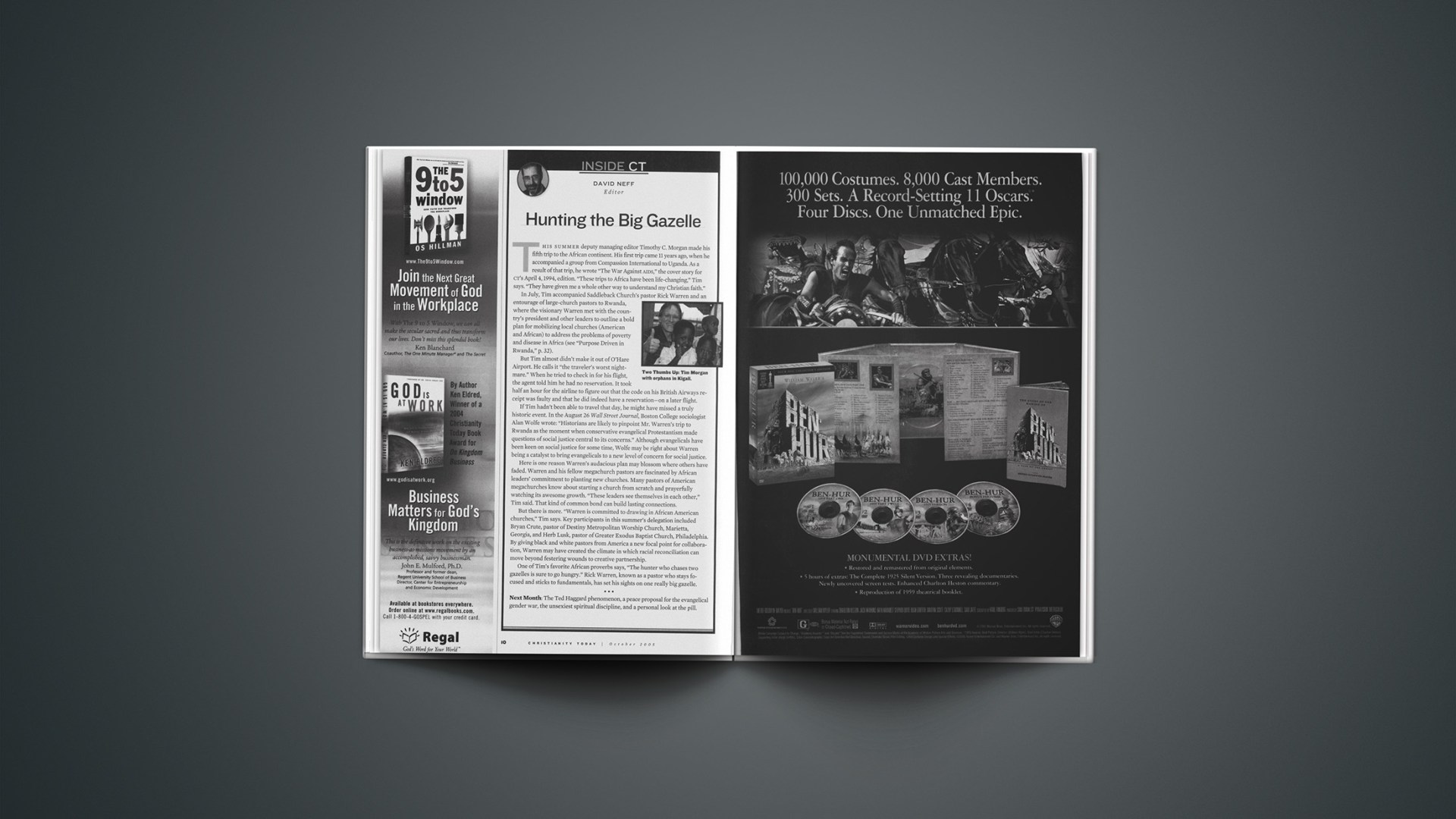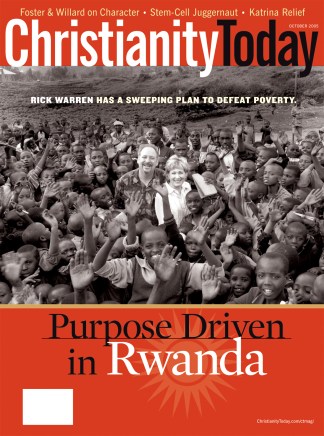This summer deputy managing editor Timothy C. Morgan made his fifth trip to the African continent. His first trip came 11 years ago, when he accompanied a group from Compassion International to Uganda. As a result of that trip, he wrote “The War Against AIDS,” the cover story for CT’s April 4, 1994, edition. “These trips to Africa have been life-changing,” Tim says. “They have given me a whole other way to understand my Christian faith.”
In July, Tim accompanied Saddleback Church’s pastor Rick Warren and an entourage of large-church pastors to Rwanda, where the visionary Warren met with the country’s president and other leaders to outline a bold plan for mobilizing local churches (American and African) to address the problems of poverty and disease in Africa.
But Tim almost didn’t make it out of O’Hare Airport. He calls it “the traveler’s worst nightmare.” When he tried to check in for his flight, the agent told him he had no reservation. It took half an hour for the airline to figure out that the code on his British Airways receipt was faulty and that he did indeed have a reservation—on a later flight.
If Tim hadn’t been able to travel that day, he might have missed a truly historic event. In the August 26 Wall Street Journal, Boston College sociologist Alan Wolfe wrote: “Historians are likely to pinpoint Mr. Warren’s trip to Rwanda as the moment when conservative evangelical Protestantism made questions of social justice central to its concerns.” Although evangelicals have been keen on social justice for some time, Wolfe may be right about Warren being a catalyst to bring evangelicals to a new level of concern for social justice.
Here is one reason Warren’s audacious plan may blossom where others have faded. Warren and his fellow megachurch pastors are fascinated by African leaders’ commitment to planting new churches. Many pastors of American megachurches know about starting a church from scratch and prayerfully watching its awesome growth. “These leaders see themselves in each other,” Tim said. That kind of common bond can build lasting connections.
But there is more. “Warren is committed to drawing in African American churches,” Tim says. Key participants in this summer’s delegation included Bryan Crute, pastor of Destiny Metropolitan Worship Church, Marietta, Georgia, and Herb Lusk, pastor of Greater Exodus Baptist Church, Philadelphia. By giving black and white pastors from America a new focal point for collaboration, Warren may have created the climate in which racial reconciliation can move beyond festering wounds to creative partnership.
One of Tim’s favorite African proverbs says, “The hunter who chases two gazelles is sure to go hungry.” Rick Warren, known as a pastor who stays focused and sticks to fundamentals, has set his sights on one really big gazelle.
Copyright © 2005 Christianity Today. Click for reprint information.
Related Elsewhere:
Purpose Driven in Rwanda | Rick Warren’s sweeping plan to defeat poverty.
Earlier CT coverage of Rwanda includes:
Healing Genocide | Ten years after the slaughter, Rwandans begin to mend their torn nation with a justice that is both biblical and African. (March 31, 2004)
Sidebar
A Justice that Restores | A method for bringing victims and offenders together. (March 31, 2004)
Inside CT: Forgiveness 101 | Rwanda is becoming a lab for testing new models of Christian forgiveness. (March 31, 2004)
Influence of Roman Catholic Church in Acquittal of Rwandan Bishop Debated | Augustin Misago cleared of 1994 genocide charges. (July 20, 2000)
Earlier coverage of Rick Warren includes:
Cover story
A Regular Purpose-Driven Guy | Rick Warren’s genius is in helping pastors see the obvious. (Nov. 8, 2002)
Forget Your Bliss | The success of The Purpose-Driven Life reveals a cultural opportunity. A Christianity Today editorial (March 9, 2004)
Saddleback’s Social Capital | The author of Bowling Alone discovers Evangelicals can be trusted at the civic table. (March 2, 2004)










